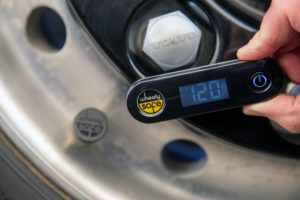Commercial fleets around the globe have long enjoyed the benefits of Tyre Pressure Monitoring Systems (TPMS), which have grown in popularity over the years to improve road safety, increase fleet operators’ reliability and cut their costs.
Highways England has calculated about 3,600 accidents and 20% of all vehicle breakdowns are directly related to flat tyres or low tyre pressure each year, and HGVs and buses have the potential to cause serious incidents if the driver loses control on the road or on-site.

ContiPressureCheck uses sensors mounted inside the tyre to continuously monitor pressures and temperatures. The system can be easily retrofitted to many vehicles and its wireless radio technology allows for easy monitoring of trailers.
Paul Broker, Fleet Engineering Director at G. Webb, said: “Every week ContiPressureCheck is making us aware of issues that the drivers weren’t noticing or weren’t actioning. It means that, where we can, it’ll be a workshop repair rather than a call out to the roadside.
“We’re saving on call outs; we’re saving on lost tyres; we’re more efficient and a safer haulier because of it. I’ve lost count of how many times it’s solved or prevented something.”
The risk to tyres at G. Webb is high as its vehicles are used at quarries, landfill sites and fields – all places where sharp, abrasive materials can damage the rubber.
Its long-haul tippers and artics come with the ContiPressureCheck in-cab display, providing real-time tyre pressures and alerting drivers to a problem immediately.
Broker added: “We were experiencing low tyre pressures and punctures on a relatively frequent basis but weren’t always aware of where, when or how they were happening.
“Sometimes, we didn’t know that there was a problem brewing until we did our weekly tyre checks on a Saturday.
“The ContiPressureCheck system has eliminated that doubt.”
Telford-based bus operator A-Star Transport has fitted Wheely-Safe’s TPMS to its vehicles, having been impressed with the simplicity and cost effectiveness of the product.
The systems are now working on all its operational vehicles, from 16-seater Mercedes-Benz Sprinter minibuses, up to 55-seater twin-axle Caetano coaches.
A-Star Transport has opted for Wheely-Safe’s external TPMS sensors, which replace the valve cap and auto-pair with an in-cab solar receiver.
These are fitted alongside a pair of wheel loss sensors on each wheel.
The business’s own in-house mechanics fitted the systems, following a demonstration from a Wheely-Safe technician.
Mike Wear, Owner of A-Star Transport, said: “The fact that we could pay a one-off price for the Wheely-Safe kit and then it was ours, appealed to us, especially after the challenges of the last few years, with Covid and the impact that had on the business.
“We have already had one slow puncture that was flagged up to the driver, and which we were able to act on quickly, to save ourselves from a more serious problem.”
Peterborough-based PJ Thory, which specialises in mixed haulage, aggregate supplies, waste management and demolition, has installed a TyreWatch system for tyres on its eight-wheeler fleet – a mix of Scania and DAF trucks.
Each wheel rim has been fitted with a unique TyreWatch sensor which uses telematics technology to monitor the pressure and temperature of each tyre in real time.
Not only is the traffic office informed of tyre pressure issues on their mobile or computer long before any driver is even aware of a problem, but also, staff can remotely check the temperature of every wheel while it is in use.
Malcolm Agger, Transport Manager, said: “We have dashboard monitors which use a simple on-screen graphic to show each tyre status.
“When it’s green all is OK, yellow means there’s an issue to check and red tells us we have a problem which needs immediate attention.

Huntapac Produce, in Preston, is also benefiting from the roll-out of Michelin’s Effitrailer telematics system on all trailers within its fleet.
This includes a TPMS which alerts the transport office if the pressure in any trailer tyre drops below a pre-defined threshold, meaning the customer can take action before it results in downtime.
Meanwhile, a new integrated TPMS solution for trucks and buses developed by Webfleet Solutions and its parent company Bridgestone, utilises sensors that monitor tyre pressure levels and tyre temperature.
The information is sent to the Webfleet telematics service platform for analysis. When an issue is detected, Webfleet alerts the fleet manager in the office and/or the driver in the cab in real time.
Notifications are triggered when abnormal tyre pressure or temperature is detected and are colour coded according to the severity of the issue.
Paul Verheijen, Vice President of Product Management at Bridgestone Mobility Solutions, said: “Webfleet TPMS is not only digitising and automating this entire process, but it also directly enables the fleet operator to make fast, informed decisions to improve road safety and reduce tyre-related costs and downtime.”
Goodyear recently launched a new smart tyre monitor app called TechHub that combines its TPMS and DrivePoint tyre inspection system. The app connects several data points from different systems, to present available tyre health data in one place.
Piotr Czyzyk, Goodyear’s Managing Director of Proactive Solutions and Fleets Europe, said: “With data intelligence becoming an increasingly important component of business, having a single hub and integrated data overview will further accelerate fleet efficiency and create direct added value for managers using the service.”
It is clear that transport firms who fit TPMS systems get long term benefits in break-down reduction and tyre cost savings.









